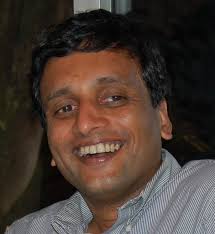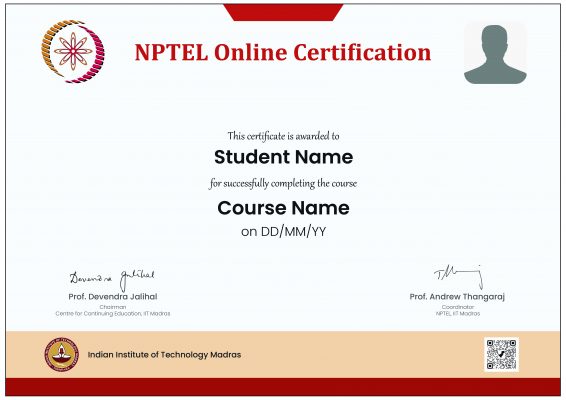Description
This course will cover basic concepts in the design and analysis of algorithms.
- Asymptotic complexity, O() notation
- Sorting and search
- Algorithms on graphs: exploration, connectivity, shortest paths, directed acyclic graphs, spanning trees
- Design techniques: divide and conquer, greedy, dynamic programming
- Data structures: heaps, union of disjoint sets, search trees
- Intractability
INTENDED AUDIENCE
Students in BE/BTech Computer Science, 2nd/3rd year.
PRE-REQUISITES
Exposure to introductory courses on programming and data structures.
ABOUT THE INSTRUCTOR

Madhavan Mukund studied at IIT Bombay (BTech) and Aarhus University (PhD). He has been a faculty member at Chennai Mathematical Institute since 1992, where he is presently Professor and Director. His main research area is formal verification. He has active research collaborations within and outside India and serves on international conference programme committees and editorial boards of journals.
He has served as President of both the Indian Association for Research in Computing Science (IARCS) (2011-2017) and the ACM India Council (2016-2018). He has been the National Coordinator of the Indian Computing Olympiad since 2002. He served as the Executive Director of the International Olympiad in Informatics from 2011-2014.
In addition to the NPTEL MOOC programme, he has been involved in organizing IARCS Instructional Courses for college teachers. He is a member of ACM India’s Education Committee. He has contributed lectures on algorithms to the Massively Empowered Classroom (MEC) project of Microsoft Research and the QEEE programme of MHRD.
Certification Process
1. Join the course
Learners may pay the applicable fees and enrol to a course on offer in the portal and get access to all of its contents including assignments. Validity of enrolment, which includes access to the videos and other learning material and attempting the assignments, will be mentioned on the course. Learner has to complete the assignments and get the minimum required marks to be eligible for the certification exam within this period.
COURSE ENROLMENT FEE: The Fee for Enrolment is Rs. 2000 + GST
2. Watch Videos+Submit Assignments
After enrolling, learners can watch lectures and learn and follow it up with attempting/answering the assignments given.
3. Get qualified to register for exams
A learner can earn a certificate in the self paced course only by appearing for the online remote proctored exam and to register for this, the learner should get minimum required marks in the assignments as given below:
CRITERIA TO GET A CERTIFICATE
Assignment score = Score more than 50% in at least 6/8 assignments.
Exam score = 50% of the proctored certification exam score out of 100
Only the e-certificate will be made available. Hard copies will not be dispatched."
4. Register for exams
The certification exam is conducted online with remote proctoring. Once a learner has become eligible to register for the certification exam, they can choose a slot convenient to them from what is available and pay the exam fee. Schedule of available slot dates/timings for these remote-proctored online examinations will be published and made available to the learners.
EXAM FEE: The remote proctoring exam is optional for a fee of Rs.1500 + GST. An additional fee of Rs.1500 will apply for a non-standard time slot.
5. Results and Certification
After the exam, based on the certification criteria of the course, results will be declared and learners will be notified of the same. A link to download the e-certificate will be shared with learners who pass the certification exam.
CERTIFICATE TEMPLATE

Course Details
Week 1
Module 1: Introduction
Module 2: Examples and motivation
Module 3: Examples and motivation
Module 4: Asymptotic complexity: informal concepts
Module 5: Asymptotic complexity: formal notation
Module 6: Asymptotic complexity: examples
Week 2
Module 1: Searching in list: binary search
Module 2: Sorting: insertion sort
Module 3: Sorting: selection sort
Module 4: Sorting: merge sort
Module 5: Sorting: quicksort
Module 6: Sorting: stability and other issues
Week 3
Module 1: Graphs: Motivation
Module 2: Graph exploration: BFS
Module 3: Graph exploration: DFS
Module 4: DFS numbering and applications
Module 5: Directed acyclic graphs
Module 6: Directed acyclic graphs
Week 4
Module 1: Shortest paths: unweighted and weighted
Module 2: Single source shortest paths: Dijkstra
Module 3: Single source shortest paths: Dijkstra
Module 4: Minimum cost spanning trees: Prim’s algorithm
Module 5: Minimum cost spanning trees: Kruskal’s Algorithm
Module 6: Union-Find data structure
Week 5
Module 1: Divide and conquer: counting inversions
Module 2: Divide and conquer: nearest pair of points
Module 3: Priority queues, heaps
Module 4: Priority queues, heaps
Module 5: Dijstra/Prims revisited using heaps
Module 6: Search Trees: Introduction
Week 6
Module 1: Search Trees: Traversals, insertions, deletions
Module 2: Search Trees: Balancing
Module 3: Greedy : Interval scheduling
Module 4: Greedy : Proof strategies
Module 5: Greedy : Huffman coding
Module 6: Dynamic Programming: weighted interval scheduling
Week 7
Module 1: Dynamic Programming: memoization
Module 2: Dynamic Programming: edit distance
Module 3: Dynamic Programming: longest ascending subsequence
Module 4: Dynamic Programming: matrix multiplication
Module 5: Dynamic Programming: shortest paths: Bellman Ford
Module 6: Dynamic Programming: shortest paths: Floyd Warshall
Week 8
Module 1: Intractability: NP completeness
Module 2: Intractability: reductions
Module 3: Intractability: examples
Module 4: Intractability: more examples
Module 5: Misc topics
Module 6: Misc topics




Reviews
There are no reviews yet.